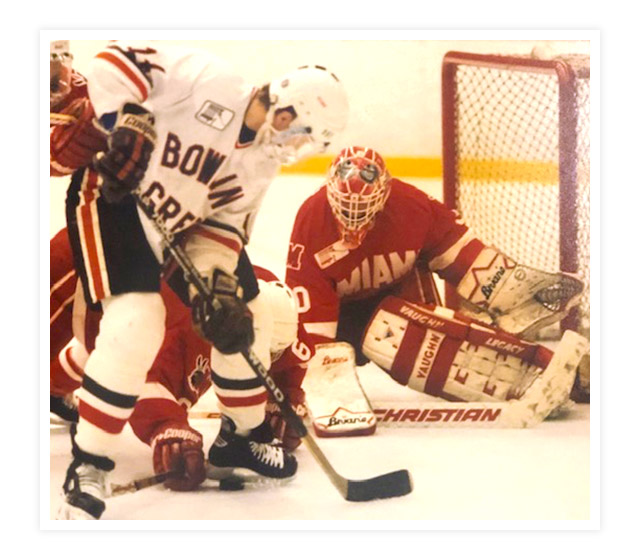Mental Health Awareness: A Story of Courage & Recovery
A former professional hockey player talks out about his struggles in order to help others and lessen the stigma about mental illness.
May 01, 2023
Written by our Founder and CEO, our Celebrations Pulse Sunday Letters aim to engage with our community. By welcoming your ideas and sharing your stories, we want to help you strengthen your relationships with the most important people in your life.
Since 2020, we’ve been hit with a series of idiosyncratic life events that have taken a toll on the community’s mental health. Besides the sickness and death brought by COVID-19, we’ve struggled with economic uncertainty, disruption in school and work, and social isolation.
The impact of the pandemic, however, only further heightened an already-existing mental health crisis. Stress, anxiety, depression, and loneliness were already an epidemic years before the emergence of the coronavirus.
Monday marks the beginning of Mental Health Awareness Month, which was started in 1949 to increase understanding of the importance of mental health and wellness. It’s also a celebration of people who have recovered and whose stories can benefit those who are still struggling.
Mental health is an important subject to us. We have written frequently about the topic in the Celebrations Pulse and in doing so, hoped to alleviate some of the stigma that still exists. Just 10 years ago, many were afraid to come forward to talk about their illness. Today, attitudes are slowly changing as people dealing with anxiety and depression are coming forward, opening up, and sharing their experiences, which is all part of recovering.
A personal story
Recently, Jim attended an event that featured Chuck Thuss, a former professional hockey player who spoke honestly about his mental health battles. When Chuck spoke, you could hear a pin drop. Jim was so touched that he invited Chuck to be a guest on the Celebrations Chatter podcast.
During the conversation, Chuck told Jim about growing up in Canada with bouts of anxiety. Chuck powered through, excelling as a goaltender in hockey and attending college in the U.S. at Miami of Ohio University. In his senior year, he was named a First-Team All-American, the first player in Miami’s history to receive that honor. Chuck went on to play professionally in ECHL, a mid-level professional league in the United States.
In the “tough” world of hockey, where men might be deemed weak for talking about their mental health, Chuck put on a brave face, despite his ever-present anxiety. "Just keep going, put your head down, don't ask questions. Don't share. Don't ask for support. Just keep going and work through it,” Chuck recalls.

When he ended his playing career, he continued coaching while running his own business as his struggles continued and deepened. Chuck told Jim that for him the world was lonely and dark, and that his self-worth was severely diminished. Chuck felt that he wasn’t really bringing any benefit to anything or anyone.
Chuck's turning point
One fateful day, it all became too much. “While driving my truck on the interstate, I contemplated crashing into a guardrail. Then an image of my daughter flashed through my mind, and I believe that God pulled me over, and he said, ‘This isn’t your time.’”
Chuck also made a very brave decision:
My mom knew everything about me, up until the day she died, so she knew I was having issues. She gave me a business card of a woman she knew and told me to call her if I ever needed help. I kept that card in my pocket for three or four years, and that day on the highway, I pulled over and called her. I told her who I was and that I didn’t want to live anymore. After a few moments of silence, she said, “You’re going to be OK.” And I was able to get the help I needed.
Chuck had the courage to admit he needed help, and he credits the unwavering support of his wife and friends. “They have all brought new meaning to me, and enabled me, in an unselfish but therapeutic way, to have better feelings toward myself.”
Sustaining mental wellness
Chuck’s comments on the importance of relationships reminded Jim of an article he read by Dr. George Everly, a member of our Connectivity Council. Dr. Everly noted how the lack of supportive friendships among men can lead to increased feelings of alienation and depression, as well as substance misuse, violence, and even suicide.
As for Chuck, he takes a moment each day to remind himself of what he is grateful for in life.
I do a gratitude journal every morning. I just take 15 or 20 minutes, and I write down the things that I'm grateful for. And sometimes they're the same, sometimes they're different. Some of the things are constant. And again, it’s not meant as an arrogant statement, but I'm just grateful to have got to the point where I am today. Finally, after 51 years, I'm grateful that I made it. And I'm grateful for this journey that I'm on.
Chuck is now using his experience to help others, encouraging them without judgment to verbalize their struggles. He also reminds everyone who may be experiencing a mental health challenge to reach out to family and friends so they can help you find the support you need.
There’s also an important role for everyone to play in improving mental health. We’ve written often about the special superpower all of us have to improve the lives of those around us. It just takes a phone call, a quick email, or text with the words, “How are you doing?” to begin a conversation that could turn into a lifeline for someone struggling. Use your power!
All the best,
Chris and Jim









